lesson11
新概念英语二册Lesson 11学习资料
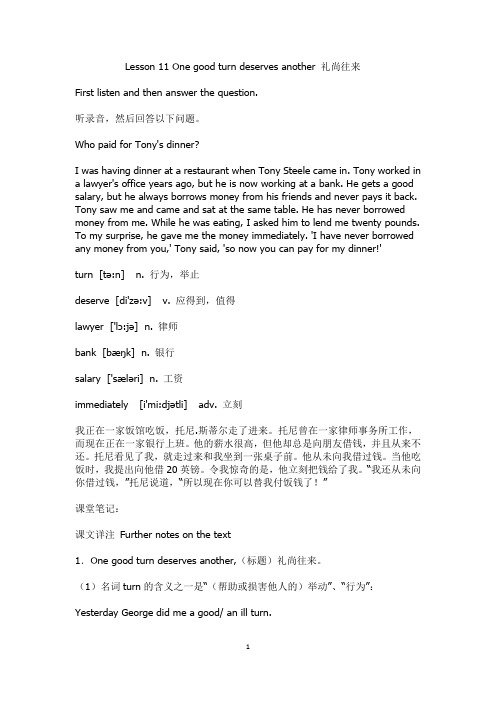
Lesson 11 One good turn deserves another 礼尚往来First listen and then answer the question.听录音,然后回答以下问题。
Who paid for Tony's dinner?I was having dinner at a restaurant when Tony Steele came in. Tony worked ina lawyer's office years ago, but he is now working at a bank. He gets a good salary, but he always borrows money from his friends and never pays it back. Tony saw me and came and sat at the same table. He has never borrowed money from me. While he was eating, I asked him to lend me twenty pounds. To my surprise, he gave me the money immediately. 'I have never borrowed any money from you,' Tony said, 'so now you can pay for my dinner!'turn [tə:n] n. 行为,举止deserve [di'zə:v] v. 应得到,值得lawyer ['lɔ:jə] n. 律师bank [bæŋk] n. 银行salary ['sæləri] n. 工资immediately [i'mi:djətli] adv. 立刻我正在一家饭馆吃饭,托尼.斯蒂尔走了进来。
新概念英语第二册Lesson11(课堂PPT)
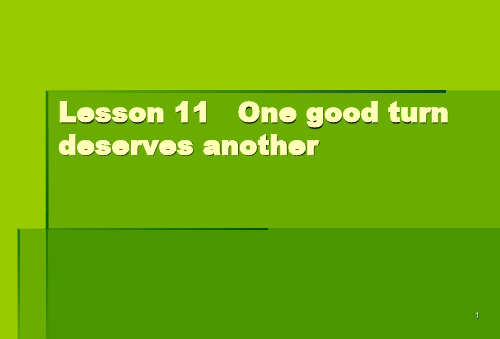
2
★turn n. 行为, 举止
▪turn n.(帮助或损害他人的)举动、行为 ▪do sb. a good / an ill turn ▪做对某人有利/不利的事。 ▪ Yesterday George did me a good/an ill turn. 乔治昨 天做了一件对我有利/不利的事。 ▪ He is always ready to do a turn for others. 他总是乐 于为他人做好事。
前 ▪ 1 )pay“偿还(债务等)”, ▪ pay back 还钱 ▪ 2)Vt. & Vi. “付,支付(价款、账单)”。 ▪ Pay for sth. / sb. 为某人或某物付款。 ▪ Pay+ 价钱 / 账单 支付钱/账单。 ▪ I paid 100 Yuan for the dress. ▪ I paid the bill.
▪ 工资很低:a poor salary; a low salary
15
▪ 2 borrow 借入 ▪ borrow sth from sb ▪ lend 借出 ▪ lend sth to sb / lend sb sth
16
▪ 3pay 在这里的意思是“偿还(债务等)”,还可解 释为“付,支付(价款、账单)等”。Pay 既是及 物动词也可以是不及物动词。
21
▪(2) 付出代价;受惩罚 ▪ He will have to pay for this foolish behaviour. ▪他将要为这种愚蠢行为而受报应。 You will pay for your dishonesty. ▪你不老实,总有一天会吃苦头的。 He paid for his laziness by not passing his exam. 他没有通过考试,这是他懒而受到的惩罚。
新概念英语Lesson11

5. This tie is his (he).
Homework
单词 4+1+1 练习册L11 L11笔记 背诵并默写L11 L11表演视频
black white blue
yellow green
red
purple greyБайду номын сангаас
It’s not my shirt. D:This is my shirt.
My shirt’s blue. T: Is this shirt Tim’s? D:Perhaps it is, sir.
Tim’s shirt’s white.
T:Tim! T1:Yes, sir? T: Is this your shirt? T1:Yes, sir. T: Here you are.
A.One B.Two
(A)2.What color is Tim's shirt?
A.white B.black
whose blue white perhaps catch
/hu:z/ /blu:/ /waɪt/
pron.谁的 adj.蓝色的 adj.白色的
/pəˈhæps/ adv.大概
/kætʃ/ v.抓住
入门考
1. That is my shirt.(同义句) 2. This is _h_e_r__ (she) dress. 3. This is not __y_ou_r___(you) suit. 4. That is _h_is___(he) father. 5. That is my sister’s watch?
whose /hu:z/ pron.谁的 blue /blu:/ adj.蓝色的 perhaps /pə'hæps/adv.大概 white /waɪt/adj.白色的 catch /kætʃ/v.抓住
兽医专业英语(扬州大学)lesson 11
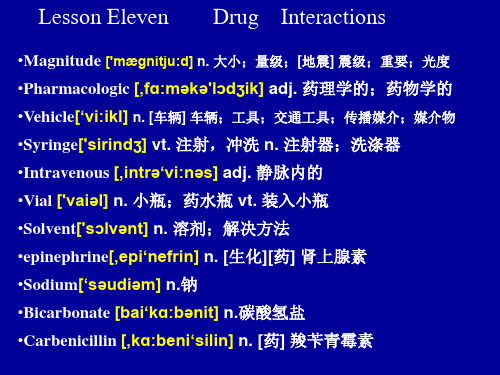
Lesson Eleven Drug Interactions
•Ketamine[‘ketəmi:n] n. [药] 氯胺酮(一种麻醉剂 ) •Barbiturate[,bɑ:'bitjurət] n. [药] 巴比土酸盐;[药] 巴比妥酸盐 •Methylprednisolone[,meθilpred'nisələun] n. [药] 甲基强的松龙 •Succinate[‘sʌksineit] n. [有化]丁二酸盐;琥珀酸盐 •Calcium['kælsiəm] n. [化学] 钙 •Gluconate['ɡlu:kəneit] n. [有化] 葡糖酸盐 •Hydrolysis [hai‘drɔlisis] n. 水解作用 •Reduction [ri'dʌkʃən] n. 减少;下降;缩小 •Complexation [kɔmplek'seiʃ(ə)n] n. 络合;络合作用(complex的名词) •Precipitation [pri,sipi‘teiʃən] n. [化学] 沉淀;冰雹;坠落;鲁莽
In vivo drug interactions may result in diminished or enhanced drug effects, expression of a new or different effect, or perhaps no obvious pharmacodynamic change but altered pharmacokinetics that may not be clinically apparent. Some drug interactions are advantageous and are exploited (开发,开拓 ) in therapy. Many others ( drug interactions ) are potentially deleterious. A documented or potential drug interaction is rarely an absolute contraindication for concurrent administration and hence becomes a component of risk assessment in therapeutic decision making.
新概念第一册Lesson11

D: This is my shirt. My shirt's blue.
1. My shirt`s=My shirt is…
T: Is this shirt Tim's?
1 .Is this shirt Tim's? Tim`s再名词后面加上“s”构成名词所有 格,翻译成“的”。
D: Perhaps it is, sir. Tim's shirt's white.
单词讲解
father=dad father-in-law 岳父;公公 mother=mom=mum mother-in-law 岳母;婆婆 father+mother=partents father/mother=parent His parents are in Germany.
★catch v. 抓住 ① v. 接住,拦住 ② v. 逮住,捕获 catch a thief ③ v. 染上(疾病) catch a cold 患感冒
单词学习
father ['fɑ:ðə]n.父亲 mother ['mʌðə]n.母亲 blouse [blaʊz]n.女衬衫 sister ['sɪstə]n.姐,妹 tie [taɪ]n.领带 brother ['brʌðə]n.兄,弟 his [hɪz]possessive adjective 他的 her [hə:]possessive adjective 她的
特殊疑问词whose
用于询问所有关系。 如果对形容词性物主代词、名词性物主代词、名 词所有格(形容词性和名词性)进行提问,就要 用到whose。(对表示“…的” 提问) 特殊疑问句构成:特殊疑问词+一般疑问句 This is my shirt. (对my提问) Whose is this shirt? =Whose shirt is this? shirt既可以放在whose后,也可以不放
冀教版七年级上册lesson 11课件
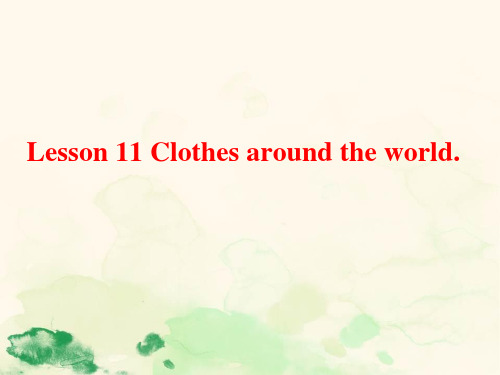
1. —I like your new shoes.
—______
A. Thank you.
B. That’s right.
C. I know.
D. Great!
2. —Is this ______ old car?
—No, it’s ______ new car.
A. an; an
B. an; a
Can you say something about the picture?
China uniforms
China sweaters
the U.S. colorful clothes
Where is the woman from?
She is from_I_n_d_i_a______.
What is the woman wearing? She is wearing_a__s_a_ri___________. How does she look? She looks_b__ea_u__ti_fu__l /_p_r_e_t_ty__/n_i_c_e_ _i_n_h_e_r__s_a_ri_.
C. a; a
D. a; an
3. Is Li Ming a boy ______ a girl?
A. and B. or C. too D. but
4. I have a new watch ______ my mom.
A. at B. from C. on D. in
5. —Do you like pink or red?
Where are the people from?
They are from__th_e__U_._S____.
What are the people wearing? They are wearing_u_n_i_fo_r_m__s_f_o_r_w__o_r_k. How do they look? They look_b_e_a_u_t_if_u_l_/_p_r_et_t_y_/_n_ic_e__ _in__t_h_e_u_n_i_f_o_rm__s__.
Lesson11教案

Lesson11教案(六年级)教学目标:1,理解和运用:__What are you interested in ?___I’m interested in ... .2,听、说、读三个短语:play computer games;make dolls;take photos.3,理解、听读Lesson11。
4,培养学生健康的爱好。
教学重点:1,理解和运用:__What are you interested in ? __I’m interested in ...2,理解、听读Lesson11。
课前准备:ppt 、录音机、磁带。
教学过程:Step1,Revision1, Let’s chantCook shows me a good cook book.The book is about a good cook.His hobby is collecting books.(group work)Look!Look! Have a look!2,Revision (pair work)T:what’s your hobby ?S1:My hobby is collecting maps.T:What’s your dad’s hobby ?S1: His hobby is playing pingpong.T:Good!Sit down. Let’s make dialogue like this.SS: ...T: Show your dialogues.SS: ....Step2,Presentation1,T: Hello, What’s your hobby ?S1:My hobby is fishing.T: Are you interested in reading ?(你对读书感兴趣吗?)S1: Yes,I am.T: Are you interested in planting flowers ?S2:No, I’m interested in cooking meals.T: What are you interested in ?S3: I’m interested in playing volleyball.....2,present ppt1,T: What are you interested in ?S1: I’m interested in playing computer games.T: What are you interested in ?S2: I’m interested in making dolls..... .2,Phrases :Play computer games ; make dolls ; take photosT; I’ll ask some students to read the phrasesS1: ...S2: ...3,TextT: Please listen and answer1, What’s Zhou Pei interested in ?2,What’s Yang Ming interested in ?3,What’s Lisa interested in ?SS: ...T: Look here.What is the baby doing ?SS: ...(It is crying.)T:What is the baby doing ?SS: It is Smiling.T: What is mother doing ?SS: She is feeding the baby.T:Ok, Let’s listen and read the text.Step3 practice and consolidation.1, read the text.2,The present continuous tense.(PPT)T:What is dad doing ?SS: He is cooking meals.T:What is mother doing ?SS: She is cooking meals....现在进行时:表示动作正在进行。
Lesson 11 现在进行时 过去进行时

1.过去进行时可表示按计划、安排过去某时 刻将要发生的动作。 He said they were leaving for Beijing this afternoon. 2.动词hope, wonder等的过去进行时常用 来表示提出要求,虽然表示现在的内容,但 语气比一般现在时或一般过去时要委婉。 I was wondering whether you could come to join us.
3.过去进行时中有always, forever, continually, constantly修饰时,表示说话人的赞赏或厌烦的感情。 He was always thinking of others.
4.由when引导的时间状语从句,主句用过去进行 时,从句应用一般过去时;如果从句和主句的动作 同时发生,两句都用过去进行时的时候,多用 while引导: When the teacher came in, we were talking. While we were talking, the teacher came in. They were singing while we were dancing
2.特殊疑问句:疑问词+be+主语+v-ing+其它? What is he doing?
用法
1.以Look!或Listen!开头的句子提示我们说话时动作 正在进行,应用现在进行时。 Look!The children are playing games over there. Listen!Who's singing in the classroom? 2.当句子中有now(现在)时,常表示说话时动作正在 进行,这时也常用现在进行时。 We are reading English now.
新概念英语第二册Lesson11(共35页)

• pay back = return the amount of money =repay还钱
• pay off 还清
• pay off the debt 还清债务
• (2) 付出代价;受惩罚 • He will have to pay for this foolish
behaviour. • 他将要为这种愚蠢行为而受报应。
You will pay for your dishonesty. • 你不老实,总有一天会吃苦头的。
He paid for his laziness by not passing his exam. 他没有通过考试,这是他懒而受到的惩罚。
• 表花费的词:
• spend:(人)spend time/money/energy on sth / (in) doing sth
time.
• 他花了大量时间才记住了这些单词. • 注意:cost的过去式及过去分词都是cost,并且不能用于
被动句.
• take后面常跟双宾语, 常见用法有以下几 种:(1) It takes sb. +时间+to do sth. 做 某事花了某人多少时间.例:
• It took them three years to build this road. 他们用了三年时间修完了这条路.
• 1工资很高:a good salary; a high salary; a fat salary
• 工资很低:a poor salary; a low salary
• 2 borrow 借入 • borrow sth from sb • lend 借出 • lend sth to sb / lend sb sth
• 进来 • 一家律师事务所 • 有一份好薪水 • 从不归还 • 坐在同张桌子边 • 为..付钱 • 另我惊奇的是
新概念三lesson11

As I expected, he did not believe me.
• as:关系代词(引导非限制性定语从句, 它 所指代的内容就是主句的整个句子的含义) • -- As we know, the earth is round. 众所周 知, 地球是圆的。 • 关系代词as和which的区别: • as所引导的非限制性定语从句, 可用在主句 之前。 • which引导的非限制性定语从句, 只能用在 主句之后。
• listen and finish the comprehension questions.
Customs Officers are quite tolerant these days, but they ca n still stop you when you are going through the Green Channel and have nothing to decl are. • 我们在运用形容词、动词时, 往往需要用副词来强调。 • really(表示“真正的”) -- a really officious person • particularly(强调“特别, 尤其是”) • absolutely(强调“绝对的”) • completely = entirely = fully = thoroughly(强调“完全的, 彻底的”) • extremely(强调“特别, 特别是”) • fairly adv.相当地, 还算(语气一般) -- a fairly gook book. 一本还算可以的书。 • very(语气程度强烈“非常”) -- a very good book. 一 本非常好的书。 • rather 语意程度接近fairly, 注意不冠词的位置。 • - a rather good book = rather a good book (更常用)
Lesson11(冀教版八年级英语上册Lesson11)
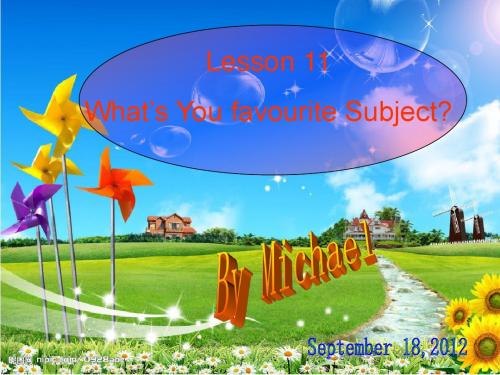
D. has
3.Do you love ( A ) about other people? A. Learning B. learn C. Learns D. learned
4.( A )time for class, let’s hurry.
A. It’s
B. this C. that
D. there
Language points
1.For our project. We will play basketball.
球类前不加the. 乐器前必须加the:play the piano“弹 钢琴”play the violin“拉小
提琴”。 棋类前不加the 男孩经常在周日弹钢琴。 Eg. The boy often plays
Listen and catch the answers: What are their favourite subject?
Danny Brian Jenny
科普版-英语-四年级上册-Lesson 11 同步讲解

ENGLISH? 这个用英语怎么说?
Leading in情景导入
Focal guidance重点导航
Let's talk谈一谈
• -Excuse me. ①What's this in English? 对不起。这个用英 语怎么说?
• -lt's a toy bus . 这是一辆玩具公共汽车。 • -ls this a car ? 它是一辆小汽车吗? • -No,it's a jeep . 不,它是一辆吉普车。 • -Who is in it?谁在它里面? • -My aunt.我的姑姑。 • -What’s that in English? 那个用英语怎么说? • -lt's a plane . 它是一架飞机。 • -Who’s in it. 谁在它里面? • -A boy. 一个男孩。 • -No,I'm not a boy.l'm a girl.My name is Joy.不,我不是一
• -He is my grandfather. • 他是我的爷爷。
• -Whose hat is it? • 这是谁的帽子?
• -lt's my grandfather's. • 它是我爷爷的。
• ③What’s that in English?那个用英语怎么说? • ◆指距离自己较远的人或事物时用that(那,那个);而指距离自己较近的
个男孩。我是一个女孩。 我的名字叫乔伊。
• -Oh!Hi, Joy! 哦!你好,乔伊!
• bus / bʌs /公共汽车 • 复数.buses • 短语:bus stop公共汽车站 • school bus校车 • 例句:I go to school by bus. • 我坐公共汽车上学。
【中文注释】五年级上册英语课文lesson 11

【中文注释】五年级上册英语课文lesson 11
现在小学英语的教学,并不给学生教授单词的音标,也不针翻译单词的具体意思,只是让学生知道课文中语句、对话的大概意思。
这样的结果是,孩子们可能看着课文会读,离开课本就基本上什么都不知道了。
因此,将课本(北京出版社)中的语句按照单词、语句每个都翻译,让孩子在朗读的时候就知道每个单词、每个句子的准确意思,明明白白地学习,十分有意义。
这样,笔者将英语课文进行了逐词、逐句的翻译,供有需要的家长和孩子们使用。
祝你们在英语学习上能更进步。
Lesson 11
课后新词:。
科普版五年级英语上册 Lesson 11 知识清单
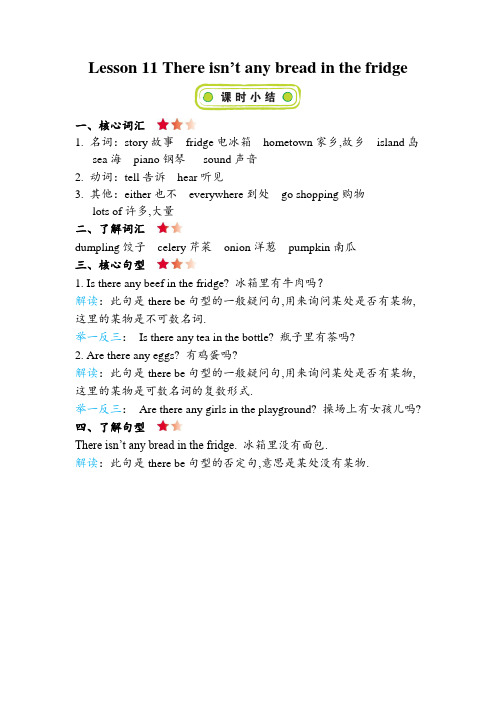
Lesson 11 There isn’t any bread in the fridge
一、核心词汇
1. 名词:story故事fridge电冰箱hometown家乡,故乡island岛
sea海piano钢琴sound声音
2. 动词:tell告诉hear听见
3. 其他:either也不everywhere到处go shopping购物
lots of许多,大量
二、了解词汇
dumpling饺子celery芹菜onion洋葱pumpkin南瓜
三、核心句型
1. Is there any beef in the fridge? 冰箱里有牛肉吗?
解读:此句是there be句型的一般疑问句,用来询问某处是否有某物,这里的某物是不可数名词.
举一反三:Is there any tea in the bottle? 瓶子里有茶吗?
2. Are there any eggs? 有鸡蛋吗?
解读:此句是there be句型的一般疑问句,用来询问某处是否有某物,这里的某物是可数名词的复数形式.
举一反三:Are there any girls in the playground? 操场上有女孩儿吗?
四、了解句型
There isn’t any bread in the fridge.冰箱里没有面包.
解读:此句是there be句型的否定句,意思是某处没有某物.。
冀教版五年级英语上册 Lesson 11
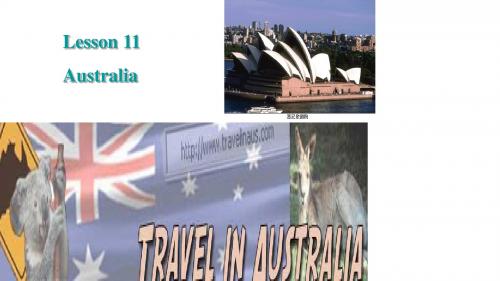
国花
在澳大利亚,金合欢是最具代表性 的植物,是国花。金合欢别名叫相思树 。属豆科的有刺灌术或小乔木, 二回羽 状复叶, 头状花序簇生于叶腋,盛开时 ,好像金色的绒球一般。
在澳大利亚,你稍加留意就会发现 ,居民的庭院不是用墙围起来,而是用 金合欢作刺篱,种在房屋周围,非常别 致。花开时节,花篱似一金色屏障,带 着浓郁的花香,令人沉醉。
The Opera House in Sydney,with the famous Harbour Bridge,floodlit behind
Travel
bushwalking surfing
diving
cycling
Customs
Australian Aborigines Christmas
Victoria
Tasmania
List things that interest you.
Animals Scபைடு நூலகம்nery Travel
Customs
Animals
Kangaroos
---large
animals
jump
about on
two legs
Australia
carrying
native
swimmer and you must make sure that _th_e__b_e_ac_h__is__sa_f_e_._.
The environment is precious and we must be
careful not to destroy it. Bring out what you _br_i_n_g_i_n____ — that is, don’t ___t_h_ro_w__r_u_b_bish in the wilderness or the ocean. Nor should you _m__ak__e_a_f_i_re___ unless it’s absolutely necessary. In fact, there are _t_im__e_s _o_f_th__e_y_e_a_r when no
